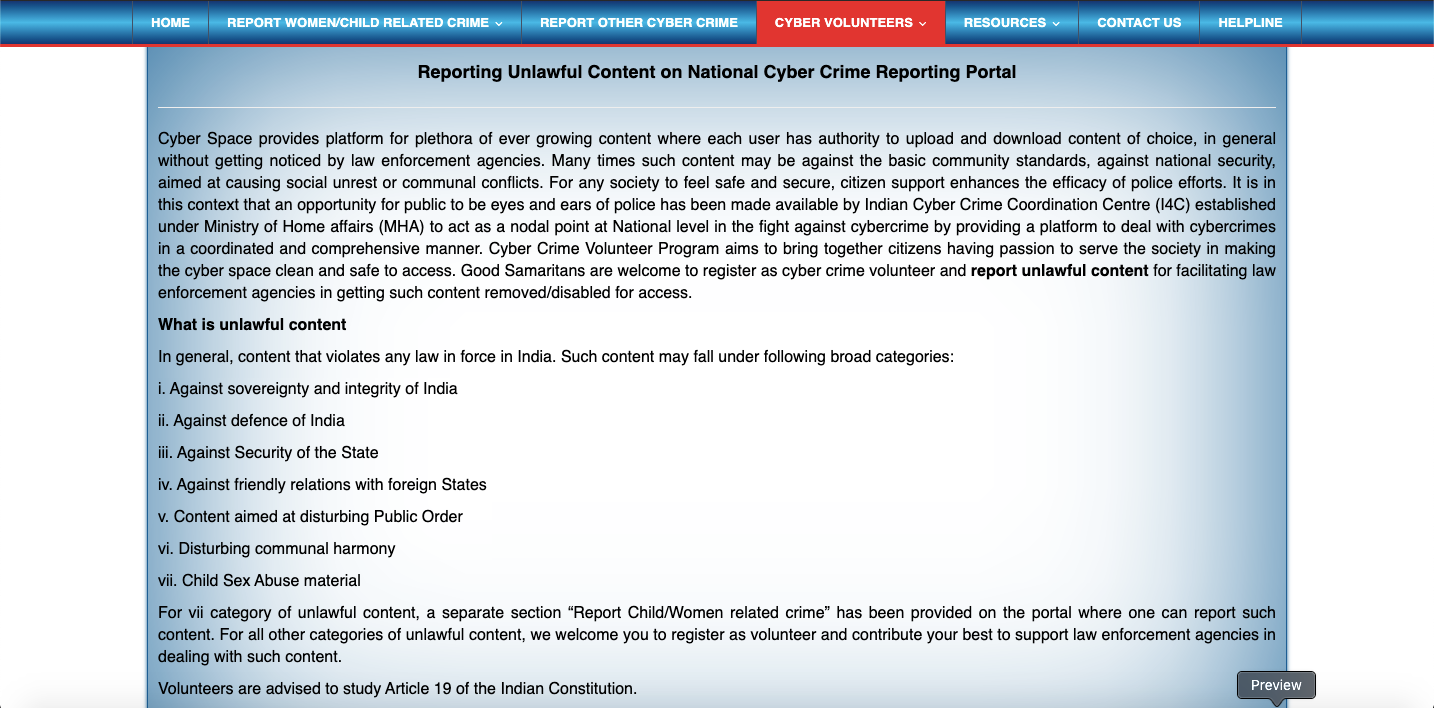India to recruit online snitches to report ‘anti-national’ activities to police
Government invites public to be 'eyes and ears of police' in move condemned by rights activists

Your support helps us to tell the story
From reproductive rights to climate change to Big Tech, The Independent is on the ground when the story is developing. Whether it's investigating the financials of Elon Musk's pro-Trump PAC or producing our latest documentary, 'The A Word', which shines a light on the American women fighting for reproductive rights, we know how important it is to parse out the facts from the messaging.
At such a critical moment in US history, we need reporters on the ground. Your donation allows us to keep sending journalists to speak to both sides of the story.
The Independent is trusted by Americans across the entire political spectrum. And unlike many other quality news outlets, we choose not to lock Americans out of our reporting and analysis with paywalls. We believe quality journalism should be available to everyone, paid for by those who can afford it.
Your support makes all the difference.The Indian government has launched a programme to identify online activities deemed to work against the “sovereignty of the nation," inviting people to register as “cyber volunteers" in a move that has fuelled rights groups' fears of online vigilantism.
India’s home ministry opened an online registration portal this week to recruit participants for the scheme, in which anyone can register to report unlawful content on social media.
It is one of the latest attempts by Narendra Modi's right-wing government to monitor the social media activities of citizens, and comes amid a dispute with Twitter over requests that the social media firm block accounts tweeting support for the massive farmers’ protest in the country.
The ministry portal lists a few broad categories of offences that it asks volunteers to flag. Besides unlawful content such as child pornography, the list includes content deemed to be against the sovereignty and integrity of India, defence and security of the state, and friendly relations with foreign nations, without providing any definition into what constitutes such offences.
The programme has already started, reportedly as a pilot, in Jammu and Kashmir, after the internet restrictions were lifted from the disputed territory on 5 February after 18 months of shutdown.
Rights activists and social media users have voiced their concerns over the new programme and government’s attempts at clamping down on critical posts. The lack of legal framework is also raising questions, as the ministry is yet to provide more information on how the programme would work.
According to the note on its website, the programme is an “opportunity for the public to be eyes and ears of police” and invites anyone to register with basic details such as a mobile number and email ID.

“This entire system seems to give ordinary citizens almost an incentive or a route to file complaints that may or may not be legally valid,” Nikhil Pahwa, digital rights activist tells The Independent.
“Some of these [categories] are vague terms which have legal definitions and legal ramifications,” he says. “Typically, it should be someone with a legal understanding of what this means or what the reasonable restrictions are, that should be tasked with filing such complaints.”
The government portal doesn’t mention any eligibility criteria for people to flag such complaints, apart from a line at the bottom that says “volunteers are advised to study Article 19 of the Indian Constitution” which deals with the rights and freedoms of citizens.
“This is an effort to involve citizens in the process to flag issues in the cyberspace, because it is so vast even the government can not monitor it,” a home ministry official told The Independent.
The official said the process would be administered by individual states and that the central home ministry “is just providing the platform”.
“We are just asking people to help us. In case someone flags things, that’s not an offence – nothing will happen,” the official said. “Whatever happens will be within the four corners of the provisions of the law.”
Those wanting to volunteer information on the platform would be required to register and “asked to submit details of their qualifications”, he said. Asked what the priority of the platform would be, the official said that “its not about anti-national issues, but about cyber crime.”
Nonetheless the breadth of the stated goals of the platform were a cause for concern, said a technology and policy researcher who did not want to be named. “When you get select terms like terrorism, radicalisation and anti-national activities, you really need a specific definition of what those terms mean,” he said.
“If you don't define those terms then legitimate political speech can come under the breadth of an order like this and therefore an order like this could be unconstitutional or excessively restricting people’s constitutionally guaranteed rights to freedom of speech and expression,” he said.
Questions have also been raised over the way the new programme has been launched, without any clarity on its legal framework.
“This whole exercise is completely illegal from where I see it,” said Anas Tanwir, a Supreme Court lawyer and founder of the Indian Civil Liberties Union (ICLU).
“The government notification does not say under what law it is being done, it is an executive action,” he added. "Any action has to be under a law.”
Mr Pahwa warned the programme would end up “creating an atmosphere of fear around free speech” in the country.
“It means that there will just be a vast amount of information that is going to be collected as complaints, which is not necessarily legally enforceable,” he said, “and it might end up leading to the harassment of citizens who may not have violated any law.”
The Modi government has been accused of misusing sweeping laws such as the colonial-era charge of sedition and the Unlawful Activities Prevention Act (UAPA) to arrest activists and keep them detained. Several activists during protests against new citizenship laws were held by Delhi police under the UAPA last year, which covers terrorist offences and is non-bailable.
Eight journalists covering the ongoing farmers' protests and the violence in the capital on 26 January have also been slapped with charges such as sedition and promoting communal disharmony.
Human rights activist and columnist Harsh Mander said police under the Modi government have been increasingly relying upon vigilante groups for information.
When the BJP-led governments of a number of states passed laws prohibiting conversion for the purpose of marriage, commonly referred to as “love-jihad” laws, right wing vigilante groups turned informant when they received word of interfaith weddings, some of which were then halted by the police.
A similar approach was noticed by activists after the controversial beef ban, in which vigilante groups informed police of alleged cow slaughter and several instances of mob lynching were also reported.
“This is part of a very conscious large trend where state backed vigilante groups are given official recognition,” said Mr Mander, a former civil servant who has been working with victims of mass violence.
“In the next three to four years, a full Hindu Rashtra [Hindu Nation] will shape, very much inspired by Nazi Germany, where young volunteers become your eyes and ears, [with] people encouraged to spy on their neighbours,” claimed the 65-year-old researcher and activist.



Join our commenting forum
Join thought-provoking conversations, follow other Independent readers and see their replies
Comments